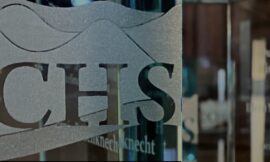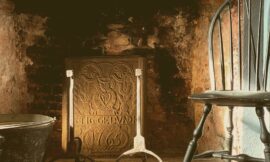For everyone

The Dutchess Award
This award honors exceptional contributions to the Dutchess County community and beyond in the areas of preservation, history, and/or education. 2022 Awardees: Lou & Candace Lewis At the 2018 Community Foundations of the Hudson Valley event which “honors individuals who are instrumental in improving lives through their community philanthropy,” Lou and Candace Lewis were recognized as “empowering local institutions both with financial support and personal involvement.” That is an apt description of their involvement with DCHS and local history for over a half century. Born and raised in Poughkeepsie, Lou’s involvement with DCHS formally started with his 1963 DCHS membership, the same year that he met Candace. “Two good choices that year,” Lou is happy to share! Candace’s involvement with local history commences at that time, as well. A practicing lawyer for 50 years, Lou has represented many local non-profits including Scenic Hudson Land Trust, Locust Grove and Walkway over the Hudson. He serves on the board of the Dutchess County Interfaith Council. His is known at DCHS for his generosity of time, financial contributions, his fundraising efforts, and his ability to recruit key people, such as the current board President and Executive Director. Candace, a Vassar College graduate with a Ph.D. from the Institute of Fine Arts at NYU, has taught art history at Vassar and Marist colleges. Among her outstanding achievements at DCHS, in addition to being DCHS president, is her eight year tenure as DCHS Yearbook editor spanning the landmark 2014 Centennial Edition to volume 100, the 2021 Women of Dutchess County, New York: Voices and Talents, Part II. Candace’s invention of a two-part consecutive series amplifies the journal’s role as an in-depth resource that is used for generations. Whether measured individually, or together, Lou and Candace leave a lasting impression and have been among a top tier of financial donors, fundraisers, and stewards of DCHS and its landmark publication, the Yearbook. Lou & Candace Lewis At the 2018 Community Foundations of the Hudson Valley event which “honors individuals who are instrumental in improving lives through their community philanthropy,” Lou and Candace Lewis were recognized as “empowering local institutions both with financial support and personal involvement.” That is an apt description of their involvement with DCHS and local history for over a half century. Born and raised in Poughkeepsie, Lou’s involvement with DCHS formally started with his 1963 DCHS membership, the same year that he met Candace. “Two good choices that year,” Lou is happy to share! Candace’s involvement with local history commences at that time, as well. A practicing lawyer for 50 years, Lou has represented many local non-profits including Scenic Hudson Land Trust, Locust Grove and Walkway over the Hudson. He serves on the board of the Dutchess County Interfaith Council. His is known at DCHS for his generosity of time, financial contributions, his fundraising efforts, and his ability to recruit key people, such as the current board President and Executive Director. Candace, a Vassar College graduate with a Ph.D. from the Institute of Fine Arts at NYU, has taught art history at Vassar and Marist colleges. Among her outstanding achievements at DCHS, in addition to being DCHS president, is her eight year tenure as DCHS Yearbook editor spanning the landmark 2014 Centennial Edition to volume 100, the 2021 Women of Dutchess County, New York: Voices and Talents, Part II. Candace’s invention of a two-part consecutive series amplifies the journal’s role as an in-depth resource that is used for generations. Whether measured individually, or together, Lou and Candace leave a lasting impression and have been among a top tier of financial donors, fundraisers, and stewards of DCHS and its landmark publication, the Yearbook. Prior Awardees Ralph & Doris Adams ~ J. Winthrop Aldrich ~ Myra Young Armstead ~ Barbara & Robert Bielenberg ~ D. David Conklin ~ Elizabeth A. Daniels ~ Frank Doherty ~ Edward E. Downey ~ Margaretta Downey ~ Jesse Effron ~ Frances Fergusson ~ John J. Gartland, Jr. ~ Joyce C. Ghee ~ Burton Gold ~ John & Gloria Golden ~ Frederica S. Goodman ~ Clyde Griffen ~ James F. Hall ~ Ada Scism Harrison ~ Bernard & Shirley Handel ~ E. Stuart & Linda Hubbard ~ Larry Hughes ~ Bradford H. Kendall ~ Michael Korda ~ Bill & Mary Lunt ~ Melodye K. Moore ~ Robert Murphy ~ Dennis J. Murray ~ Joseph N. Norton ~ Walter Patrice ~ Ruth Stafford Peale ~ Alice Provensen ~ Frances S. Reese ~ Caroline Reichenberg ~ Lorraine M. Roberts ~ Gretta Tritch Roman ~ Albert M. Rosenblatt ~ Fred Schaeffer ~ Dr. Sam Simon ~ Willa Skinner ~ Elizabeth Smith ~ Roger Smith ~ Marie Tarver ~ Gretta Tritch Roman ~ Denis D. VanBuren ~ Barbara Van Itallie ~ Norma W. VanKleeck ~ Kay Tremper Verilli ~ Mary Kay Vrba ~ Richard K. Wager ~ Kenneth Walpuck ~ Thomas S. Wermuth
Posted in: Awards, DHCS Events, For everyone

Excellence in Education
Honors teachers at Dutchess County middle or high schools who bring innovation and creativity to impart a love and appreciation of local history. 2022 Awardee:Henry Frischknecht, Bulkeley Middle School, Rhinebeck Henry came to our attention last summer when he led an effort across Bulkeley Middle School Social Studies Classes, in Rhinebeck, encouraging students to creatively express what they learned about the event called Juneteenth, which had just been announced as a new federal holiday. Ensuring students were briefed with a good deal of local history, students created individual flags that when put together added up to a single iconic flag that was featured on the front lawn of Rhinebeck Town Hall. Frischknecht is known for having abandoned the old memorize-and-test approach. Instead, he invents creative approaches that use innovative technology to first inform students about a subject, and then subsequently asks them to express their critical thinking and understanding in equally creative ways. One of his most recent projects involves having students develop a documentary film discussing topics related to the Civil War. He has brought in local film makers, leveraged students’ technological aptitude and brought in a multitude of primary sources, allowing them to research, script, film, and edit their own movies. “This is the kind of authentic experience that helps our kids to think critically and be creative outside of the classroom” he said. Henry holds a BA in Liberal Arts from Dutchess Community College, continued his education at SUNY Albany where he majored in History with minors in Religious Studies and Anthropology, and completed his M.Ed degree at Marist in 2010.
Posted in: Awards, DHCS Events, For everyone
St Paul’s Church Wurtemburg Records
The Hudson River as Battlefield
THIS PAGE IS UNDER CONSTRUCTION TO AN UPDATED PLATFORM, THANK YOU FOR YOUR PATIENCE… This online exhibition offers insights into the October 1777 British action, as well as insights into Franklin Roosevelt’s unrelenting commitment to the understanding and publication of local history even as global war emerged and commenced. jump to FDR’s Yearbook Articles on the October 1777 event jump to British Ship Logs Obtained by FDR jump to June 1777 Livingston Letter: Me Worry? Won’t Happen! jump to What a Cannonball Can Do George Washington called West Point, just south of Dutchess County on the Hudson River, the key to the North American Continent. Historians agree the success of the American patriots relied on the defense of the Hudson River Valley, which the British where the British hoped to take control to divide the emerging United States in half. In October of 1777 a single trip north by the British as far as Red Hook, Dutchess County, did show the potential for such a raid, and resulted in the complete destruction of the capital of New York at the time, Kingston. Certain homes, barns with agricultural products, and stores were targeted with cannon ball or were torched and burned. The dramatic event would attract the attention of any local historian. But the fact that the ships traversed the area of Franklin Roosevelt’s ancestral homes, gave it an extra dimension and power for him. FDR’s Yearbook Articles President Roosevelt wrote an article for each of the 1935 and 1936 DCHS Yearbooks, where his trusted partner, Helen Wilkinson Reynolds was editor. DCHS’s Helen Wilkinson Reynolds. back to top British Documents DCHS Collections: Envelope containing information from the British Admiralty directed to FDR, who then gave them to DCHS. The articles are written about the material he obtained through requests to the head of the British Admiralty and the US Embassy in London. Britain’s Lord Halifax shown at right. Middle top: with Nazi leader Herman Goering. Middle bottom: with British Prime Minister Winston Churchill. Right: with FDR. When Halifax was made US Ambassador in 1941, FDR broke with protocol and met Halifax in his private sloop. back to top Henry Livingston, Sr. Letter Poughkeepsie June 16, 1777 Loving Brother, Your negro just now delivered me the Bond and Tenant Books with your letter of the 7th instant and am sorry you are again attacked with the gout. Your being so long freed was in hopes it would have quitted you. Captain Phillip Cortland was here this morning and left Peeks Kill yesterday all in quietness and the Armies in Jersey as yet very peaceable. As for the English Army coming up this river I am under no apprehension of, because I think it would be great madness in attempting it. We are all in good health and join in our love to your sister and children. And am… your loving brother, Henry Livingston. back to top Henry Livingston, Jr. House The son of the author of the letter found his home hit by a single cannonball. The 1919 DCHS Yearbook published a photograph of the patched shingle at the front of the house (right). Among the artifacts in DCHS Collections is the beam that was damaged by the cannonball in 1777 (below). It was removed when the house was demolished in the late 19th century. back to top
Posted in: 18th Century, Countywide, For everyone

Bill Jeffway, Executive Director
Bill Jeffway has served as the Executive Director of the Dutchess County Historical Society since 2017. In that role, he seeks to maintain the organization’s sterling reputation for historical thoroughness, accuracy, and pursuit of historical truth, while finding creative ways to express that history in a 21st century with its many demands and distractions. Bill grew up in Northampton, Massachusetts, where he joined the local historical society at age 13. He earned a B.A. from Wesleyan University in Middletown, CT with a double major in American Studies and English. His senior year focus was on the Hudson Valley in the 19th century. Professionally, Bill spent 30 years in global corporate advertising at the firm Ogilvy & Mather working in its New York City, London, Singapore and Los Angeles offices, largely with technology companies like IBM and Cisco as his clients. Other roles & publications History Speaks. Bill is active as the founder/principal of History Speaks, an independent and flexible partnership which works to identify and creatively share insights related to local history, through which he has published two books. Click on any image below to be taken to the publication which will open in a new window. History of the Town of Milan. This Place Called Milan tells the story of immigrants as varied as the abolitionist Quakers, the slave-owning Palatines, and a Native population. The book examines the role of topography, water, and the role of being in-between in determining how and where we settle, and what we do for work. Rhinebeck Post Office Murals. The second is a booklet called Invisible People, Untold Stories which is the product of a community conversation, involving Celebrating the African Spirit, about the depiction of enslaved persons of color in the the Rhinebeck US Post Office. The title is respectfully taken from the landmark article on local Black history published in the 1987 DCHS Yearbook, by Lorraine Roberts and Lawrence Mamiya. Poughkeepsie Black History Trail. In partnership with the Mid-Hudson Antislavery History Project, Bill authored a storymap trail of important locations in Poughkeepsie related to Black history. Local Frederick Douglass Celebration. Celebrating the African Spirit. Bill serves on the research committee of this Poughkeepsie-based organization dedicated to raising the profile of local Black history. Among the most satisfying outcomes recently was the reenactment of a talk by Frederick Douglass at Poughkeepsie’s College Hill by Hamilton musical actor Paul Oakley Stovall, based entirely on the findings of the committee. A message from the Executive Director. One of the things that greatly attracts me to DCHS is its focus, from the very beginning in 1914, on the relentless pursuit of historical truth. This focus requires a constant search for new information, its interpretation, and its creative expression. The organization has focused on knowledge and insight that goes way beyond the traditional role of managing a historic house or featuring museum objects, although DCHS’s record there is strong as well! One of the less visible but substantial roles of DCHS is archival preservation and restoration. The wonderful 18th century stone house, Clinton House in Poughkeepsie, is the location of 4,000 linear feet of fire-safe metal shelves and storage units on three floors, archive-save boxes and containers, and year-round climate control. I hope in my time here at DCHS, we have made great progress in making all of DCHS’s extant history, historical research, and archives more accessible through digitization of finding aids, indices, publications and photographs. The Dutchess County Historical Society Yearbook, the longest serving historical journal in the state, is now entirely available online; every issue since 1914, in addition to other published books. For new research, DCHS has put an emphasis on lesser-told stories: persons of color, women’s history, and stories of veterans’ service. As a non-profit 501c3, DCHS is supported entirely by gifts from members, business sponsors, and donors, receiving no taxpayer money. This gives us the distinct advantage of be able to captain our own ship, we are answerable to the distinguished members, friends, and business supporters who enable our work. I hope you will consider becoming involved in any of the many ways available. DCHS Yearbook: Published since 1914, the DCHS Yearbook is New York State’s longest-serving historical journal with contributions from a wide range of professional and home grown historians. DCHS Awards: For historical, community and business l best practice, through its annual awards, DCHS spotlights best practice as inspiration to others. Programs and Exhibitions: DCHS is employing the most diverse and creative tools to engage the community, from online videos and trails and tours, to classroom programs and visits, to classic exhibitions in physical locations across the county. Archival Preservation: DCHS oversees an archive of thousands of objects, documents, photographs and textiles; and offers research support to DCHS member/donors through online resources and its traditional library. Library & Online Research Tools: With a class research library housed at Clinton House in Poughkeepsie, DCHS continues to expand its online tools for local research, including the Walter M. Patrice Online Library for the Study of Local African Heritage.
Posted in: For everyone
Photos Reveal A Single Point In A Multi-generational Family Dry Cleaning Business
Posted in: Decoding Dutchess Past, For everyone
